Dates for 2025 FIDE WWC in Batumi, Georgia announced

During the celebration of FIDE’s centenary in Tbilisi, FIDE announced the official dates and location for the highly anticipated 2025 Women’s World Cup. This prestigious event will take place in the picturesque seaside city of Batumi, Georgia, from July 5 to 29, 2025. Georgia holds a special place in the history of women’s chess, having produced some of the most legendary female players in the world. Batumi, known for its beautiful Black Sea coastline, is a fitting venue for this major tournament, which will gather the world’s top female chess players in a battle for glory. Chess in Georgia Georgia’s legacy in women’s chess is unparalleled. The country is home to iconic figures like Nona Gaprindashvili, the first woman to be awarded the title of Grandmaster by FIDE in 1978. Gaprindashvili was a five-time Women’s World Chess Champion, holding the title from 1962 to 1978, and her achievements laid the foundation for Georgia’s continued excellence in the sport. Another legend, Maia Chiburdanidze, succeeded Gaprindashvili as Women’s World Champion at 17, becoming the youngest player ever to win the title at that time. Chiburdanidze held the championship for 13 years, further solidifying Georgia’s reputation as a dominant force in women’s chess. These legendary players have inspired generations and maintained the country’s strong tradition in chess. It is no coincidence that Georgians are the reigning Women’s World Team Champions. The 2025 Women’s World Cup is a celebration of this rich heritage. Hosting the event in Georgia is a nod to the country’s contribution to women’s chess and a reminder of the enduring legacy of its champions. It is a fitting tribute to a nation that has shaped the course of women’s chess history and continues to be an inspiration for future generations. World Cup 2025 Selection The Women’s World Cup selection process remains consistent with the 2023 format, ensuring that the strongest and most deserving players will compete. 103 players will be selected according to specific criteria. Prize Fund The prize fund will also match that of the previous edition; a total prize fund of US$676,250, with the first prize of US$50,000, maintaining the tournament’s status as one of the most lucrative in women’s chess. Furthermore, the top three finishers in the Women’s World Cup will earn their spots in the 2025-26 Women’s Candidates Tournament, setting the stage for the next World Championship cycle. Previous Edition The 2023 edition of the Women’s World Cup was a highly competitive and thrilling event held in Baku, Azerbaijan, from July 30 to August 20, 2023. The tournament featured a knockout format, with intense matches that showcased the highest level of skill and determination. Aleksandra Goryachkina emerged victorious, adding this prestigious title to her already impressive record. Notably, Nurgyul Salimova reached the finals, which propelled her to the elite and reserved her spot in the Candidates. Photo: Stev Bonhage While the regulations for the tournament are still being finalized, with the potential for format changes, the 2025 FIDE Women’s World Cup promises to be another exciting and competitive event. FIDE is committed to delivering an unforgettable competition that will not only honor the rich legacy of women’s chess in Georgia but also contribute to the growth of women’s chess worldwide.
WGP Tbilisi: Assaubayeva emerges as sole leader
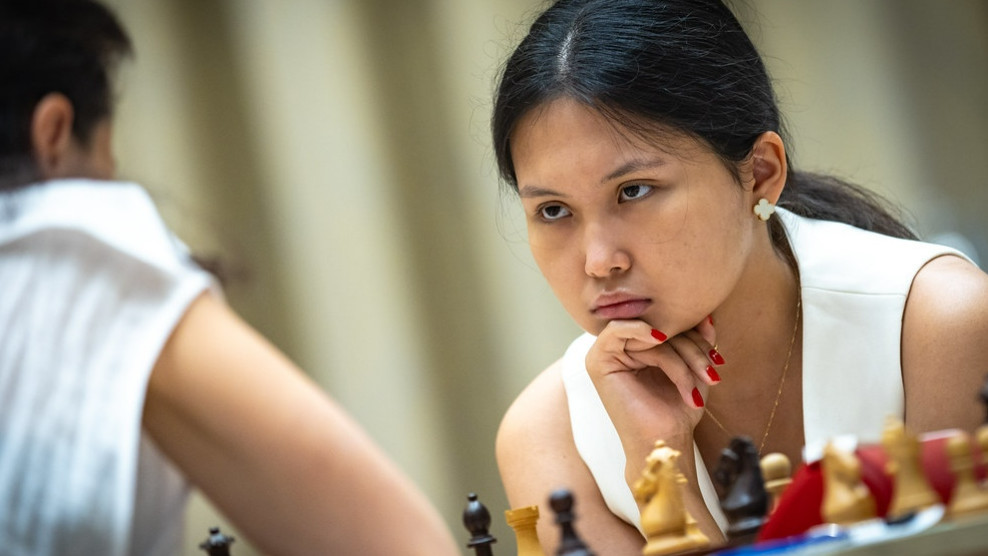
After seven rounds at the inaugural 2024/2025 Women’s Grand Prix tournament, a sole leader has finally emerged. Bibisara Assaubayeva leads the field with 4.5 points after defeating former Women’s World Champion Alexandra Kosteniuk in a complicated game. With just two more rounds to go, Assaubayeva holds a half-point lead over a group of four other players Almost all games in round seven promised tension and excitement, but all except one ended in a draw. Assaubayeva’s victory came in the Catalan, where Kosteniuk found herself on the back foot, allowing White to seize the initiative. Both players made mistakes in a very complicated game, but Kosteniuk’s errors in critical moments proved costly. She ended up in a lost knight endgame, which Assaubayeva efficiently converted to secure her win. ith this victory, Assaubayeva reached 4.5 points, claiming sole first place for the first time in the event, which shows how closely matched the players are. Kosteniuk remains on three points after seven rounds. One of the leaders from day one, Stavroula Tsolakidou, split the point with Nana Dzagnidze. The Georgian opted for the Caro-Kann, but Tsolakidou emerged with a better position early in the opening, only to lose the advantage in the later stages of the game. This was Tsolakidou’s sixth consecutive draw in the tournament. Both players now have four points. Sara Khadem drew with Alina Kashlinskaya in a Benko Gambit. Both players surprised each other in the opening, but as the game progressed, Khadem found herself on the defensive. Despite Black being a pawn up, the game transitioned into a rook endgame that Khadem confidently drew. Kashlinskaya, who won her first game in round six against Vaishali, now has four points. Khadem, showing improvement in the second half of the tournament with 2.5 points from her last three games, remains at the bottom of the scoreboard alongside Vaishali. Vaishali Rameshbabu and Anna Muzychuk played a balanced game in the Italian Opening, with neither side gaining a significant advantage. Muzychuk now has 3.5 points, while Vaishali stands at 2.5 points. Lela Javakhishvili drew with Mariya Muzychuk in the English Opening. Despite twice gaining a notably better position, Javakhishvili misplayed, allowing Muzychuk to equalize. After 55 moves, the game ended in a draw. Mariya Muzychuk now has four points, while Javakhishvili trails with three. Standings after Round 7 Here follows a closer look at the games of round seven: Bibisara Assaubayeva – Alexandra Kosteniuk Assaubayeva opted for the Catalan, but Kosteniuk knew her drill and nearly equalized. Assaubayeva made a tactical attempt that did not fully work, but Kosteniuk’s imprecise responses kept White’s chances alive. Despite missing several opportunities to secure her advantage, Assaubayeva eventually broke through in an endgame after Alexandra’s serious mistake. 37…Nb4? It was essential for Black to counter on the kingside with either 37…f5! or 37…Ne1+ But now: 38.h5+! Kf6 39.Nc5 Rxa2 40.Ne4+! Ke5 41.Rxa2 Nxa2 42.Ke3 Nb4 43.f4+! Kd5 44.Nf6+!! A wonderful move by Assaubayeva. White gets to the g7-pawn, and it is all over for Black. 44…Kd6 45.Ne8+ Ke7 46.Nxg7, and it was now a question of technique which Bibisara executed precisely. Stavroula Tsolakidou – Nana Dzagnidze In the Caro-Kann, Tsolakidou got an early advantage winning exchange and gaining a better position. Nana defended resourcefully and eventually got her chance. After either 22. Qf4 or 22. Qxf8 White could have continued to pressure Black. Stavroula, however, played 22. Qh4 but after 22…d4! 23. Nf3 d3! Dzagnidze got sufficient counterplay. The game eventually reached a balanced position, where Tsolakidou correctly placed her rook on the back rank, preventing further progress by Black. The game ended in a draw after 51 moves. Vaishali Rameshbabu – Anna Muzychuk In the Italian Game, neither player gained a significant edge throughout the game. Following several exchanges in the center, the players entered a drawn queen endgame and agreed to a draw on move 40. Sarasadat Khademalsharieh – Alina Kashlinskaya Kashlinskaya played the Benko Gambit, but after Khadem chose the trendy 5.e3 (the first choice of chess engines), she spent significant time in the opening. Eventually, Alina gained the upper hand after several Khadem’s inaccuracies. However, Sarasadat held firm, transitioning into a rook endgame where she successfully defended against Kashlinskaya’s extra pawn to secure a draw. Lela Javakhishvili – Mariya Muzychuk In the English Opening, both players had opportunities to take the lead, but neither capitalized on their chances. Javakhishvili could have got serious winning chances with a subtle 20. Rb1! (suggested by chess engines) followed by 21. Qxc5, although it is tough to see why the immediate capture on c5 (both with the pawn and the queen) is inferior to the intermezzo. After Lela played natural 20. dxc5, she was slightly better due to her control of the center, but failed to maintain the advantage. Muzychuk later also missed her chance later on. Instead of playing 25.Qb4, White went for 25.Red1, allowing Black to run through her position with the e-file pawn. But Muzychuk returned the favor to Lela by misplaying: 25…Rc7, and the position was even. The game transitioned into an even rook endgame. Both players tested each other but ultimately agreed to split the point. Round eight starts on Friday, August 23, at 3 PM local time in Tbilisi, Georgia. Round 8 pairings Alexandra Kosteniuk – Mariya MuzychukAlina Kashlinskaya – Lela JavakhishviliAnna Muzychuk – Sarasadat KhademalshariehNana Dzagnidze – Vaishali RameshbabuBibisara Assaubayeva – Stavroula Tsolakidou For more information about the event, including news, images, regulations, pairings, and games, please visit: womengrandprix.fide.com/ Written by Milan Dinic Photos: Anna Shtourman
The official song of 45th Chess Olympiad is out!

The Chess Olympiad, the largest global chess event, will be hosted by Budapest between 10 and 23 September. Zeneszöveg.hu and Artisjus organised an international songwriting camp where participants wrote songs to honor this prestigious event. One of these songs, written by Rose May and Raul, has been selected as the official song of the Chess Olympiad. Chess is coming home to Hungary in September—this sport has been highly popular here since its beginnings. It’s not only pro players that are involved in the most noble game of intellect—many Hungarian historical figures loved this game, including Ferenc Deák, Lajos Kossuth and Frigyes Karinthy. Some composers were also avid chess players—Ferenc Erkel composer, for example, was really passionate about chess and played whenever he could. This year Zeneszöveg.hu cooperated with Artisjus to organize a camp where music and chess met. Composers, lyricists and producers from nine countries came to spend three days in the camp to work with their Hungarian colleagues and create songs inspired by the 45th Chess Olympiad. From these songs, Trojan War by Rose May and Raul has been selected as the official song of the 45th Chess Olympiad by the Hungarian Chess Federation and the National Event Management Agency, the Hungarian organizers of this grand event. ROSE MAY & RAUL – TROJAN WAR – Official song for Chess Olympiad 2024 (youtube.com) This is a modern song with elements of pop and drum and bass, and its dynamic character evokes the excitement of chess games. Rose May and Raul’s song also has a video clip. With a special visual character and riveting storytelling, the clip, just like the song, features motifs of chess and speaks about love and strategy. Rose May’s debut as a singer-songwriter was in the autumn of 2023, when, along with BÖBE, P.Y.F.U., Brenka and others, she was featured on Toldyuuso’s album, SESSION_01. Her first album came out in 2023. Raul rose to fame in 2011, when he created a number of songs and clips with Tamás Horváth, which have become immensely popular since. Legendary players and rising stars from all over the world are coming to the 45th Chess Olympiad. The venue is the BOK Sports and Conference Centre, and the competition will be accompanied by an expo. The expo will offer a number of chess-related activities, bringing the sport closer to people of all ages. You can follow the games live, with professional commentators helping those who are less knowledgeable about chess, and the Hungarian Chess Federation is organizing a number of activities. All events and activities of the expo are free.
WPG Tbilisi: Alina Kashlinskaya joins leaders as the sole winner in Round 6
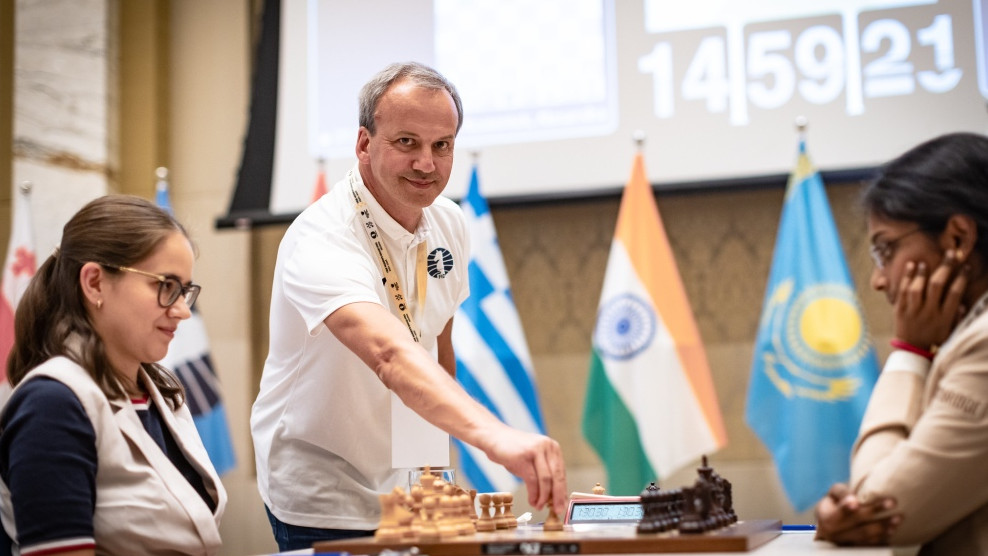
Alina Kashlinskaya claimed a hard-fought victory against India’s Vaishali Rameshbabu, moving into the leading pack with 3.5 points out of six. Nana Dzagnidze missed a chance to take the sole lead after giving away a winning position against Bibisara Assaubayeva The first leg of the 2024–2025 Women’s Grand Prix is now entering its final stages, with six out of nine rounds finished. Round six commenced with FIDE President Arkady Dvorkovich making the ceremonial first move in the game between Kashlinskaya and Vaishali. In the Dzagnidze–Assaubayeva game, FIDE Vice President Mahir Mammedov from Azerbaijan, a notable supporter of chess in Georgia, was honored with making the first move. Despite several promising positions, only one game ended decisively, while the other four resulted in draws. Alina Kashlinskaya triumphed in a fiercely contested game against Vaishali Rameshbabu. In the King’s Indian, Vaishali employed the sharp 9…b5 line, which Kashlinskaya was well-prepared for. White took control after move 15 and confidently converted her advantage. This victory puts Kashlinskaya at 3.5 points, among the tournament leaders, while Vaishali remains on two points. Bibisara Assaubayeva once again pulled off a miraculous save, this time against Nana Dzagnidze. In a King’s Indian where Dzagnidze was clearly better as early as by move 19, but she eventually faltered, allowing Assaubayeva to escape with a draw. Dzagnidze attributed her inconsistent play to her slow recovery after giving birth seven months ago, stating, “I will definitely need to sit down and revisit this.” Both players now sit at 3.5 points. Sara Khadem, playing the Morphy Defense against Mariya Muzychuk, reached a significantly better position, nearing victory. However, a critical misstep involving the exchange of queens nearly nullified her advantage. Although she continued to press in the endgame, Muzychuk skillfully countered all attempts, resulting in a draw. Mariya ends the round with 3.5 points, while Sara has two points. Alexandra Kosteniuk and Lela Javakhishvili were the first to finish in today’s round, splitting the point in a Ruy Lopez. Kosteniuk is now at three points, while Javakhishvili has 2.5 points. The longest game of the day was between Anna Muzychuk and Stavroula Tsolakidou. Despite nearly five hours of play, neither side managed to gain a decisive advantage, leading to a drawn bishop endgame. Both players are now at 3.5 points. Standings after Round 6 Here follows a closer look at the games of round six. Alexandra Kosteniuk – Lela Javakhishvili Lela Javakhishvili played the Berlin Defense against Alexandra Kosteniuk and reached a comfortable position. The game ended in an early draw after a threefold repetition. Mariya Muzychuk – Sarasadat Khademalsharieh Sara Khadem played the Morphy Defense in the Ruy Lopez. She began pressuring the center and nearly broke through in the middlegame. Despite being a pawn down, Black’s position looked promising. White’s 16.Re1? missed the opportunity to exchange queens, hoping for salvation in an inferior endgame. Sara should have taken on f3 with her bishop, followed by Rb8, but instead played 16…Qb8, allowing White to regain footing after 17.Nbd2. Black eventually regained the pawn and achieved a better position again, but inaccuracies in execution allowed Mariya to hold, and the game ended in a draw after 55 moves. Alina Kashlinskaya – Vaishali Rameshbabu This was the sharpest game of the round, with both players navigating tactical complexities from the outset. In the King’s India Vaishali surprised with the 9…b5 line, which, though unexpected, was familiar to Kashlinskaya from prior preparation. Here, Vaishali faced a difficult decision. The computer suggested 14…a6 followed by e3 at some point. Instead, she played 14…Ng4?, giving White a clear edge. Though Kashlinskaya’s response wasn’t perfect, she ultimately secured a significant advantage. By move 29, White was completely winning. Vaishali made a desperate pawn push down the kingside, but the powerful centralization of White’s queen ruined her hopes. Kashlinskaya maintained her composure and clinched the win, forcing Vaishali to resign four moves down the road, with a queen promotion inevitable. Anna Muzychuk – Stavroula Tsolakidou This game between was a prolonged struggle, with White’s achieving the 2:1 pawn majority on the queenside and a promising endgame. It looks like White missed her chance on move 37. After 37. Nb7+ followed by 38. Nc5 Stavroula would have been doomed for an uphill battle in a highly unpleasant endgame. However, after a somewhat sluggish 37. Be2, Black got off the hook. The game extended to 57 moves, ultimately ending in a draw. Nana Dzagnidze – Bibisara Assaubayeva In this matchup between two leaders of the round, Nana Dzagnidze, playing the system authored by Smyslov against King’s Indian, quickly gained the upper hand, outpacing Bibisara on the clock. The position was balanced, but White’s 15.b4 began pressing the center. Black’s ambitions 15…Rg8? and delayed reaction with 16.c5 Nh5? allowed White to seize the initiative. Nana eventually sacrificed an exchange, gaining a dominant position. However, in a turn of events reminiscent of her earlier games, Nana started to err, allowing Bibisara to turn the tables. White is clearly dominating despite being an exchange down. Here 31. Rc6 or 31. Rd1 would have kept Black on the ropes as she had no real play. Instead, Nana opted for 31. Qd1? and dropped her advantage with a couple of substandard moves. Later on, she was forced to exchange her queen for two rooks, but Black’s passer on the c-file and Nana’s imprecise play led to a draw. Round seven starts on Thursday, August 22, 3 PM local time in Tbilisi, Georgia. Round 7 pairings: Bibisara Assaubayeva – Alexandra KosteniukStavroula Tsolakidou – Nana DzagnidzeVaishali Rameshbabu – Anna MuzychukSarasadat Khademalsharieh – Alina KashlinskayaLela Javakhishvili – Mariya Muzychuk For more information about the event, including news, images, regulations, pairings, and games, please visit womengrandprix.fide.com/ Written by Milan Dinic Photos: Anna Shtourman
FIDE endorses Leap KK 9909 clock
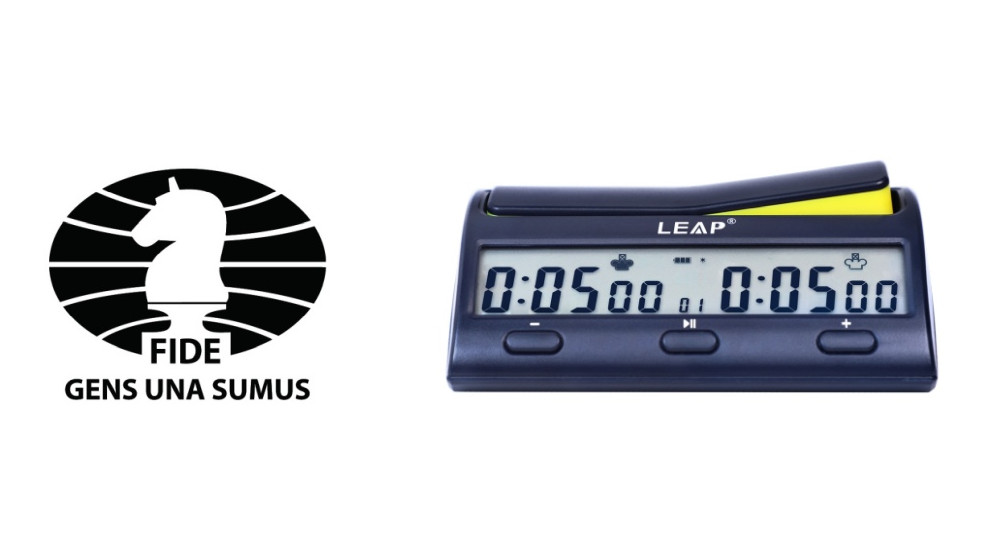
FIDE is pleased to announce the official endorsement of the Leap KK 9909 Clock, now available at LEAP. This endorsement, under decision CM2-2024/17, represents another step towards assisting vendors in producing affordable chess equipment. The Leap KK 9909 Clock underwent rigorous testing and evaluation by IA Arasu Balasubramaniyan and IA Hendrik du Toit from the Technical Commission’s Critical Tec Department, headed by IA Mario Held. The clock meets all the criteria for FIDE Compliant Electronic Chess Equipment, details of which can be found in the FIDE Handbook. The FIDE Technical Commission remains committed to fostering innovation in the chess community by employing advanced technology. For any inquiries or further information, please contact Hendrik du Toit at secretary.tec@fide.com.
FIDE celebrates centenary in Tbilisi with chess legends
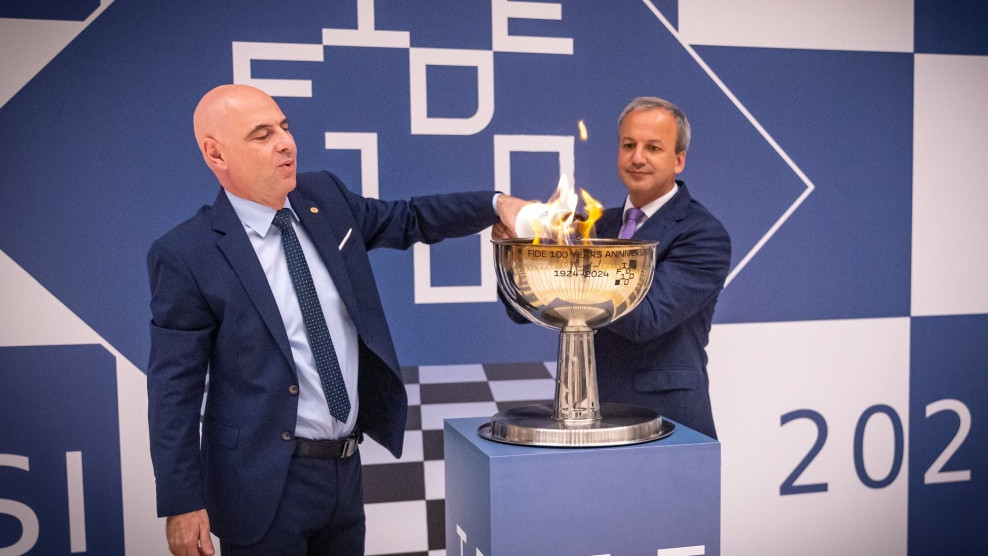
The FIDE 100 Torch Relay, commemorating the centenary of the International Chess Federation (FIDE), arrived in the Georgian capital today, marking a significant milestone in the year-long global celebrations The torch, which began its journey in India in February, was ceremoniously lit this afternoon at the Congress Hall of the Biltmore Hotel by FIDE President Arkady Dvorkovich and President of the Georgian Chess Federation Akaki Iashvili, along with other distinguished guests. “It is my pleasure and honor to be here for the first stage of the Women’s Grand Prix. I am delighted to celebrate FIDE’s 100th anniversary. The torch has traveled to many countries, including Canada just a few days ago, and now it has arrived in Tbilisi. I would like to thank the Georgian authorities and the Georgian Chess Federation for welcoming us. Georgia has consistently hosted top-level events, and we are grateful for that. I am sure we will return here again,” said FIDE President Arkady Dvorkovich. Akaki Iashvili informed the audience about an ongoing project to provide Georgian chess players with the best instructive chess books, translated into Georgian. During the ceremony, these books were handed out to Georgian players by FIDE President Arkady Dvorkovich. The event was graced by the presence of Georgian and international chess dignitaries, including participants of the Women’s Grand Prix tournament, all of whom wore white shirts with the FIDE100 insignia and the Georgian flag on the sleeve. One of Georgia’s most revered chess figures, Nona Gaprindashvili, delighted the audience by playing a friendly chess match with FIDE President Arkady Dvorkovich. In a twist, midway through the game, they stepped away from the board, inviting another pair of players—Anna Muzychuk and Alina Kashlinskaya—to continue the match. The game was then passed along to other participants in the Women’s Grand Prix. In celebration of the occasion, a giant 120cm tall commemorative cake shaped like a chess queen was presented at the end of the ceremony. Women’s World Cup dates announced During the FIDE 100 ceremony in Tbilisi, FIDE officially announced the dates and location for the upcoming Women’s World Cup. The tournament is set to take place in the picturesque seaside city of Batumi, Georgia, from July 5 to 29, 2025. This announcement marks a significant milestone in the chess calendar, as the Women’s World Cup will bring together the world’s top female players to compete in one of the most anticipated events of the year. An important place for Georgian and chess history The venue for the FIDE 100 ceremony, the Congress Hall of the Biltmore Hotel, holds deep historical significance. This Tbilisi landmark, which once housed sessions of the Georgian Parliament, is symbolic in the country’s history. It was here that the 1991 Act of Restoration of State Independence and the 1995 Constitution of Georgia were signed. The hall also has a special place in chess history, having hosted the finals of the 2017 FIDE World Cup between Levon Aronian and Ding Liren. The Tbilisi celebration is one of many global events marking FIDE’s 100th anniversary, reflecting the enduring legacy of chess and its continued relevance on the world stage.
Infinite Chess online panel discussion for chess teachers and tutors announced

Online panel discussion for chess teachers and tutors, “Chess for children with an autism spectrum disorder. Learn and teach”, will take place on August 24, 2024, between 13:00 and 15:00 CEST. The main goal of the discussion is to share the partners’ experiences and ask the most challenging questions while implementing the project. The conference will be held online via Zoom. Zoom link: https://us06web.zoom.us/j/86838350771?pwd=dp6ZLMwpCLNr1aq0NHLad8KpbSEBM0.1 Meeting ID: 868 3835 0771 Passcode: 11862 Schedule of the event 13:00 – welcome speech by Dana Reizniece-Ozola, Project supervisor, Deputy Chair of FIDE Management Board 13:05 – welcome speech by the Anastasia Sorokina, Leader of the project, FIDE WOM Chair 13:10 – Educational program benefits: field insights (Sharon Whatley, Gibraltar) 13:20 – Questions & Feedback 13:30 – Frequent challenges: behavior, emotions regulations, discipline (Evguenia Charomova, New Zealand) 13:40 – Questions & Feedback 13:50 – Parental support & social acknowledgement, stigmatization (Melodi Dincel, Turkey) 14:00 – Questions & Feedback 14:10 – Social project funding: search, tricks and increase (Pep Suarez, Menorca, Spain) 14:20 – Questions & Feedback 14:30 – Roadmap update: 6 stage of the project: Sep-Dec, 2024 (Maria Tamkovich, project coordinator, FIDE) 14:40 – Questions & Feedback Panel discussion agenda About Infinite Chess Project FIDE INFINITE CHESS Project aims to increase knowledge and awareness of chess for children with autism spectrum disorder (ASD), give practical advice to teachers and parents, study the benefits of introducing to chess and develop various teaching methods. Supported by FIDE and IOC the pilot project went global in 2021 and thrives in 19 countries for more than 150 children with ASD. Each year Infinite Chess team organizes Educational Seminars “Chess for children with ASD. Learn and teach”. The main goal of this seminar is to provide core knowledge and practical advice for teachers, trainers, and parents who wish to teach chess to kids with autism. The first educational program “Methodological guide for teachers” is available in English, French, Spanish, Russian, Arabic. Official website: infinitechess.fide.com/
FIDE Council meeting July 21 and 29, 2024: List of decisions
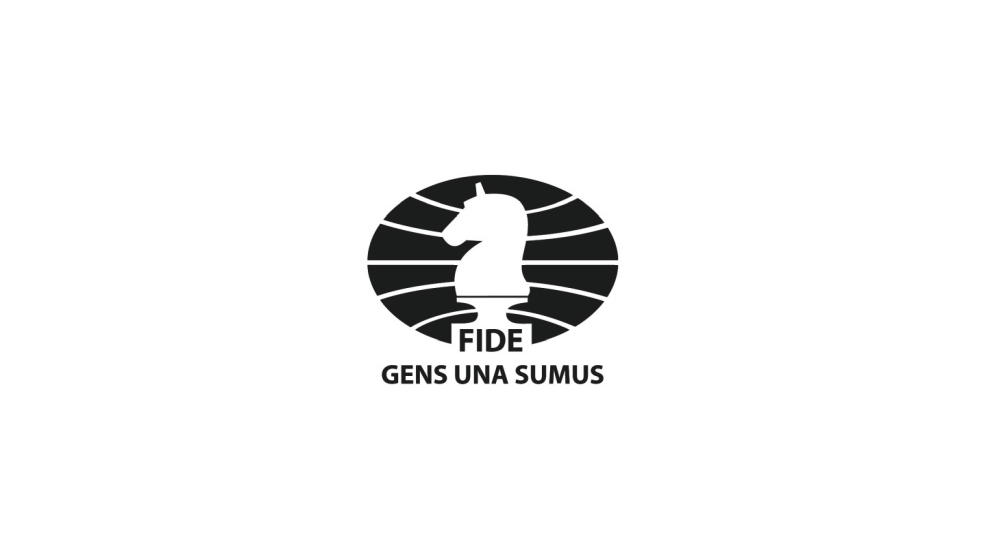
CM2-2024/01 To note President’s report. CM2-2024/02 To approve Treasurer’s report. CM2-2024/03 To approve Recommendation of Verification Commission on suspension of member federations in arrears, Burkina Faso and Rwanda. CM2-2024/04 To appoint Mr. Nigel Short as a reverse delegate for the Burkina Faso Chess Federation effective from July 29, 2024 with the period of his mandate till September 30, 2024. To authorize the reverse delegate within his mandate: – to evaluate and send FIDE requests about FIDE titles, ratings, events; – to select and register the team for the FIDE Chess Olympiad 2024, as well as to liaise all related matters; – to liaise with national authorities, facilitating the solution of internal matters CM2-2024/05 To note the report of Mr. V. Bologan in respect of the situation in Bosnia and Herzegovina Chess Union. CM2-2024/06 To note the report of Mrs. D. Reizniece-Ozola in respect of the preparations for the Chess Olympiad 2024 and FIDE Congress 2024 in Budapest, Hungary. CM2-2024/07 To approve the updated Regulations for the Women’s Grand Prix 2024. CM2-2024/08 To note the Global Strategy Commission’s report. CM2-2024/09 To approve the Global Strategy Commission’s proposal in respect of Appeals Committee Procedural Rules. Table of Changes CM2-2024/10 To note the Arbiters’ Commission’s report. CM2-2024/11 To approve the recommendations of the Arbiters’ Commission on Seminars, Classification upgrades, Amendments to the lecturer list, FA norms and titles. CM2-2024/12 To approve the Arbiters’ Commission’s proposal in respect of the changes in the ARB report forms. Table of Changes CM2-2024/13 To approve the recommendations of the Qualification Commission on titles. CM2-2024/14 To note the Chess in Education Commission’s report. CM2-2024/15 To approve the recommendations of the Chess in Education Commission on titles. CM2-2024/16 To approve the Chess in Education Commission’s proposal in respect of the award of the Senior SLI titles on an expertise basis. Table of Changes CM2-2024/17 To approve the Technical Commission’s proposal in respect of the endorsement of Leap Clock model KK 9909 for official use. CM2-2024/18 To approve the Technical Commission’s proposal in respect of Play-off and tiebreak regulations. Table of changes CM2-2024/19 To approve the Technical Commission’s proposal in respect of Swiss Pairing System Rules. CM2-2024/20 To approve the recommendations of the Trainers’ Commission on titles and Academies. CM2-2024/21 To approve the recommendations of the Events Commission on titles. CM2-2024/22 To approve the Events Commission’s proposal to replace FIDE World School Individual Championship with FIDE World Championships under 7-17 and rename FIDE World Championship under 8-12 in principle, starting from 2026, and to request the Commission to finalize the respective Regulations. CM2-2024/23 To note the Fair Play Commission’s report. CM2-2024/24 To approve the Fair Play Commission’s proposal in respect of FIDE Fair Play Definitions. CM2-2024/25 To approve the Fair Play Commission’s proposal in respect of FIDE Fair Play title regulations. Table of Changes CM2-2024/26 To refer the proposals of the Fair Play Commission related to: FPL Appointment Regulations, FPL Financial Regulations and Fair Play Regulations, back to the Commission to be updated based on the feedback received from the FIDE Council. To request the Commission to submit the updated documents to the Management Board and the FIDE Council. CM2-2024/27 To note the Commission’s for Women’s Chess report. CM2-2024/28 To note the Rules Commission’s report. CM2-2024/29 To approve the Rules Commission’s proposal in respect of video assistance system for tournaments. CM2-2024/30 To note the Chess in Multi Sports Games Committee’s report. CM2-2024/31 To note Continental Presidents’ reports. CM2-2024/32 To recommend to the General Assembly to ratify the Greenlandic Chess Federation application as a FIDE Affiliated Member. CM2-2024/33 To note the position of the Chess Federation of Canada with respect to the proposed affiliation of the Quebec Chess Federation with FIDE. CM2-2024/34 To continue the discussion regarding the proposal of the delegate of the Irish Chess Union Mr. O’Connor in respect of the best score prizes for the Olympiad. CM2-2024/35 To take note of the proposal of the FIDE Historical Committee in respect of the FIDE Awards. FIDE Council members to provide their opinions to reach the FIDE Office by August 12, 2024. CM2-2024/36 To note the update regarding FIDE 100 Years Anniversary. CM2-2024/37 To request the advisory opinion of the Constitutional Commission regarding a number of proposals to the General Assembly Agenda. CM2-2024/38 To approve the Resolution regarding proposals on amendments to the Charter. CM2-2024/39 To hold the 2024 3rd FIDE Council meeting in Budapest, Hungary, during the FIDE Congress 2024.
FIDE 100 Celebrations in Quebec City

Text and photos by WGM Anna Burtasova In April, alongside the FIDE Candidates, the centenary celebrations of the International Chess Federation took place in Toronto. In August, the festivities moved to another part of Canada, the historic Quebec City. Founded in 1608 by explorer Samuel de Champlain, Quebec City is unique in North America with its fortifications, narrow streets, and 400 years of architecture. Besieged five times, it was finally conquered by the British in 1759. Initially the capital of New France, then of British North America, it is now the heart of French culture on the continent. The Royal 22nd Regiment hosted a beautiful ceremony at the Citadelle of Quebec, part of the city’s fortifications, on Sunday, August 18. The event began with a torch relay for the Chess Olympiad, which starts in less than a month in Budapest. Members of the Regiment carried the torch through the Citadelle’s entrance and handed it to the President of the Quebec Chess Federation, Eric Bopala. He took it to the square inside the fortifications and passed it to the Mayor of Quebec, Bruno Marchand, and Deputy Chair of the Management Board, Dana Reizniece-Ozola. You can follow the whole way the torch made through the video on FIDE Twitter. Mayor Bruno Marchand lit the cauldron and poetically remarked on the significance of the FIDE 100 celebrations in his city: “Chess represents something bigger than the game itself. It’s about universality; it’s a language that brings people together.” Dana Reizniece-Ozola added: “It is very symbolic that we have lit this cauldron here in the Citadelle because it shows the strong correlation between chess and the military. It represents a mindset of strategic and tactical thinking and strong discipline. There is no easy way to success; you need to work hard. You are as strong as your weakest spot in the position, and there are many other similarities, like honoring and respecting your opponent.” After the torch ceremony, members of the 22nd Regiment acted as human chess pieces and reenacted the final moves of a game between Wilhelm Steinitz and Emanuel Lasker from the 1894 World Championship Match. Lasker won this game and eventually the match to become the second world chess champion. The representation was both artistic and military-serious. The public was especially impressed by the ending when all the men representing the white pieces went down on one knee in resignation. The action was supported by the Regiment’s orchestra. The Regiment’s mascot, the legendary goat, was also present, standing very still and contemplating the moves in front of him. The ceremony was attended by Lieutenant Colonel Regis Bellemare, the guardian angel of military chess in Canada, President of the International Association of Francophone Chess (AIDEF) Patrick Van Hoolandt, FIDE Continental President for Africa Tshepiso Lopang, President of the Chess Federation of Canada Vlad Drkulec, grandmasters Nigel Short and Evgeny Bareev, among other distinguished guests. Many participants of the Francophonie Championship (RIDEF), which was running concurrently, were also in the audience. The final round will commence on Tuesday, August 20, to determine the winners. Later that same day, grandmasters Nigel Short and Evgeny Bareev gave simultaneous exhibitions at the city’s landmark, the magnificent Chateau Frontenac. Each took on more than a dozen opponents, and some managed to walk away with draws or wins. After a busy day dedicated to FIDE’s centennial celebrations, the 2024 Francophonie Blitz Championship was held in the evening at Laval University. Canadian GM Shawn Rodrigue-Lemieux became the 2024 Francophonie Blitz Champion, and Canadian WGM Maili-Jade Ouellet won the first women’s prize. On Monday, the events dedicated to FIDE 100 continued. An open-for-public conference, moderated by Patrick Van Hoolandt and presented by chess historians Georges Bertola and Guy Gignac, took place in Château Frontenac. It focused on the creation of FIDE under the inaugural presidency of Alexander Rueb, from 1924 to 1949. An exhibition of artifacts connected to the life and work of world champion Alexander Alekhine also took place that evening. Some unique items on display had never been unveiled to the public before. Earlier that same day, the Francophonie Rapid Championship took place. GM Christian Bauer (France) was crowned champion, with WGM Maili-Jade Ouellet (Canada) taking the women’s prize.
Women’s Grand Prix Tbilisi R5: The day of surprising twists
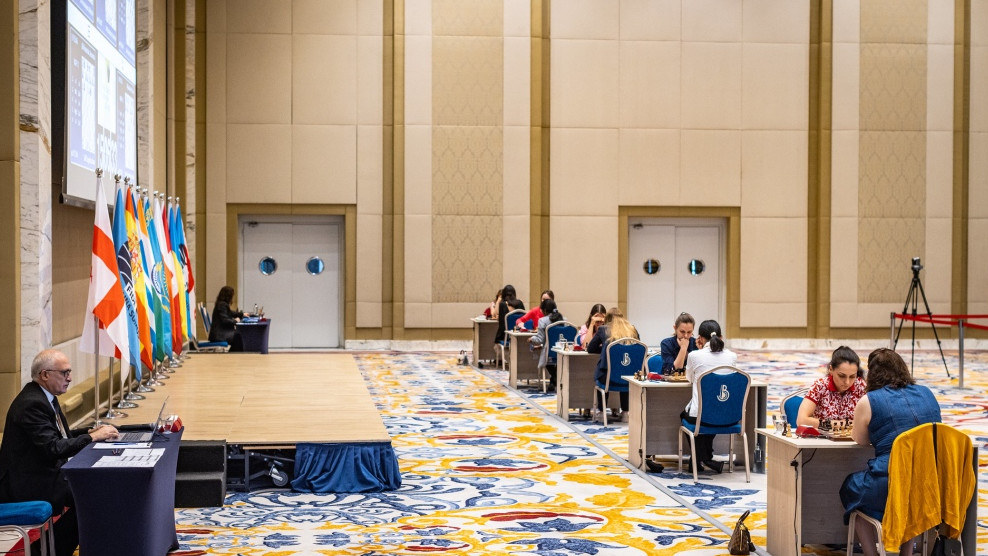
Three of the five games saw wild twists and turns, with players trading advantages, sometimes move by move. Nana Dzagnidze emerged victorious against Alexandra Kosteniuk after catching a lucky break following a daring line she chose. Vaishali Rameshbabu suffered a defeat at the hands of Mariya Muzychuk despite having a significantly better position earlier in the game. Stavroula Tsolakidou and Alina Kashlinskaya traded advantages throughout their endgame, ultimately finishing in a draw. With five rounds completed and four remaining, four players lead with three points each It was an unusual day at the Women’s Grand Prix in Georgia. Typically, players are less ambitious in their play before the rest day, as one experienced chess pundit noted before the round. This seemed to be the case initially, as most games saw rapid opening play, and the first game to finish, between Bibisara Assaubayeva and Anna Muzychuk, ended in a peaceful draw. However, as the day progressed, unexpected storms erupted on the remaining boards. The most anticipated matchup of the round was between Georgia’s Nana Dzagnidze and former Women’s World Champion Alexandra Kosteniuk. After spending considerable time in the opening, Dzagnidze opted for a risky line in the Nimzo-Indian Defense, sacrificing a bishop. Initially, this appeared to be a miscalculation: Kosteniuk, playing rapidly, seemed to be in preparation, while Dzagnidze was using up her time. However, a series of mistakes from Kosteniuk completely turned the game around, putting Dzagnidze in a winning position. Kosteniuk tried to emulate Dzagnidze’s miraculous escape against Anna Muzychuk in round four but found no such salvation this time. After misplaying advantageous positions in the earlier rounds, fortune finally favored Dzagnidze, who won the game and secured a spot among the leaders with three points. Kosteniuk, missing her chance to take sole lead, finished the first half of the tournament at 50%. A similar story unfolded in the game between Vaishali Rameshbabu and Mariya Muzychuk. In the Italian Game, both players ventured into a sharp position where Vaishali emerged with a significant advantage. However, in just a few moves, the game slipped away from her. She underestimated Black’s kingside threats and launched an attack that backfired, leading to a lost position. With this victory, Mariya Muzychuk joined the leading pack with three points, while Vaishali remains on two. The game between Stavroula Tsolakidou and Alina Kashlinskaya saw the most dramatic shifts of the day. In the Ruy Lopez, Kashlinskaya found herself in trouble during a complex middlegame and ended up in a worse position. However, as the game transitioned to an ending, Tsolakidou lost her grip, and Kashlinskaya found herself with a winning chance. Unfortunately for Kashlinskaya, she missed several opportunities to secure the win, and the game eventually ended in a draw. This was enough to keep Tsolakidou among the leaders with three points, while Kashlinskaya sits at 2.5 out of five. Round five also saw Sara Khadem win her first game of the tournament. Playing in the Exchange Variation of the Queen’s Gambit Declined, Khadem capitalized on a blunder by four-time Georgian Women’s Champion Lela Javakhishvili on move 19. Khadem played accurately thereafter, not allowing her opponent any chances to salvage a draw. This victory marks Khadem’s first in the event, though she still finds herself in last place with 1.5 points. Having been out of competitive play for more than six months, some rustiness is to be expected. Lela Javakhishvili remains on two points. With five of nine rounds played, the players will have a rest day on Tuesday before the games resume on Wednesday, August 21. Standings after Round 5 Here follows a closer look at the games of round five of the Women’s Grand Prix in Tbilisi: Nana Dzagnidze – Alexandra Kosteniuk This was the derby of the round. In the Nimzo-Indian, Nana spent a significant amount of time in the opening, deliberating whether to go for a line involving a piece sacrifice. At first glance, the position looks like a typical opening setup without much excitement. However, the main line here for White involves taking on d5, leading to a sharp game: 8.cxd5 Bxf1 9.dxe6 Ba6 10.exf7+ Kxf7 11.e4. This results in a very sharp position where White has two pawns for a piece and an attack on the black king. Other options for White include 8.b3 and 8.Qf3. After 20 minutes of contemplation, Nana decided on 8.cxd5, directly entering the piece sacrifice line. 8. cxd5 Bxf1 9.dxe6 Ba6 10.exf7+ Kxf7 Here, both 11.e4 and 11. Qb3+ continuations have been tested extensively, with the former option being considered slightly better for White. 11…Ke8 12.Ne6 According to engines, the position is now equal. Kosteniuk played very quickly, indicating this was likely part of her preparation. From here, things started to deteriorate for Nana. 12…Qd7 13.Ng7+ Kd8 White has three pawns for a piece, but the computer evaluates the position as significantly better for Black. 14.e4 Nc6 15.Be3 Na5 Here, 15…Ng4 was the engine’s first choice. 16.Qc2 At this point, Kosteniuk made two consecutive mistakes. 16…Bxa3? The first one. Alexandra should have played either 16…Kc8 or 16…Ng4 with a slightly better position. 17.Nf5 Bb4? The second mistake. Here, Kosteniuk should have played 17…Bxb2 18.Qxb2 Nxe4 19.Nxe4 Qxf5 20.Qc2 Qd5 21.f3, with the position being roughly equal. Now, White got a chance to activate her pieces and turn the tables. 18.Bg5 Rf8 19.e5 Black needed to either move her king to safety or open the c6-vent for the king. Instead, Kosteniuk made a critical error. 19…Qe6?? Again, 19…Kc8 was a better choice, although Black’s position is no joy. White is now completely winning. 20.Ne3! Be7 21.exf6 Bxf6 22.Bxf6+ Rxf6 23.b4 Nc4 24.Rxa6 Not only has White regained the bishop, but she is also a knight up. Kosteniuk continued to play, hoping to find a perpetual check. Unfortunately for her, Dzagnidze played accurately and recovered the time lost in the opening. Kosteniuk resigned on move 43. Bibisara Assaubayeva – Anna Muzychuk In the Queen’s Gambit Declined, Black started with an isolated pawn in the center.

